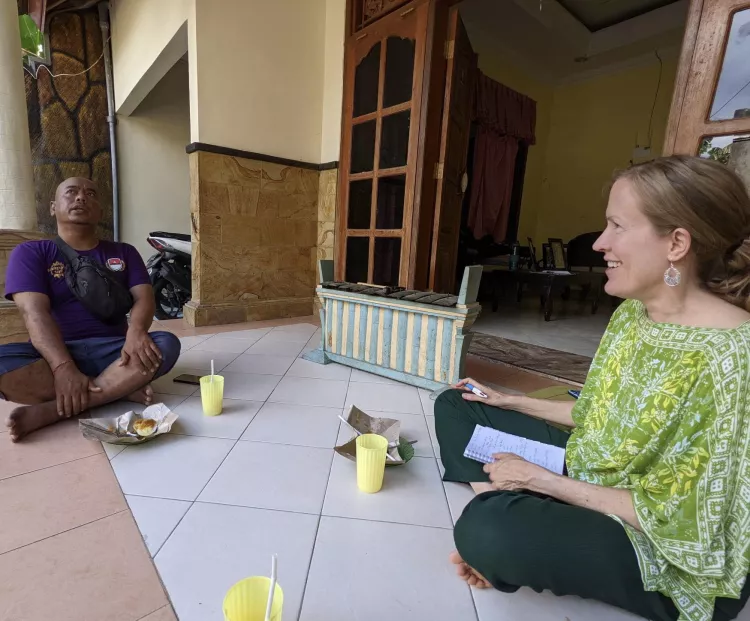Dr. Sonja Lynn Downing ‘98

Dr. Sonja Lynn Downing ’98 remembers her first exposure to gamelan with fondness. She recalls taking Professor Tom Whitman’s course, Music in Asia, during her sophomore or junior year at Swarthmore. She was initially drawn to the course because of the wide variety of requirements it fulfilled for her music major, but that was soon to change. For the class’s first session, Whitman played music from Japan, China, North India, and Indonesia, and Downing remembers feeling both eager and overwhelmed at the prospect of studying it. As a flutist and pianist, the repertoire she had studied up to that point was rooted “squarely in classical music.” Over the course of her studies, Downing delved deeply into the structures and melodies of Gamelan and other Asian music genres. While she did not know it at the time, this class “veered [her] off into a new direction” and would change the rest of her life.
During this period, Professor Whitman had been working with the music department to purchase a set of gamelan instruments. Downing recalls the day they arrived on campus as being “better than Christmas.” She and many of Whitman’s other students helped to unload the truck delivering the instruments, and were the first to see and handle them. “I remember that the instruments were shipped in a dismantled state, and each component was wrapped in woven palm-leaf mats that gave off this incredible fragrance that evoked a place I had yet to get to know. We eagerly unwrapped each piece and assembled them together in what became the gamelan room.” That day, Downing became a founding member of Swarthmore’s Gamelan Semara Santi. She appreciated how the ensemble was open to community members as well as students, it helped her escape the “Swarthmore bubble” and bond with people that she may have not interacted with otherwise. She enjoyed working with I Nyoman Suadin, which gave her the opportunity to learn from someone “ steeped in the tradition and culture of the music.”
After graduation, Downing moved back to her home state of California to look for work. Professor Whitman recommended she apply for a job with Gamelan Sekar Jaya, a non-profit organization that promoted the study and education of Balinese Gamelan. Downing got the job, and learned a lot about Bali and Indonesian culture through her work.
Next, Downing set her sights on graduate school. While her interests leaned towards ethnomusicology, she was still playing the flute and had aspirations of teaching the instrument at her own studio. Ultimately, she decided to get her master’s in flute performance at the University of California, Santa Barbara, to gain more performance experience. There she studied under the world renowned flute professor Jill Felber for two years.
Once she’d earned her master’s degree, Downing traveled to Bali to continue studying gamelan, which proved a formative experience for her. Not only did her time there “expand [her] mental and intellectual horizons,” but it exposed her to social issues that exist in the education of gamelan. Downing witnessed many instances where sexist assumptions of male instructors made learning gamelan difficult for women and girls. Instructors often held the belief that the most important feature of female gamelan ensembles was their looks, and Downing remembers an instance when a gamelan professor told a female group to “smile and look pretty” before their performance. Male instructors often gave female ensembles slower songs to perform, as they believed that women could not keep up with faster tempos. This practice routinely worked against the instructors, as slower gamelan songs are often more difficult to learn and memorize. Downing’s experiences in Bali resonated with her, and on her return to America she decided to pursue her PhD in ethnomusicology at UCSB. She eventually returned to Bali to research gender issues in gamelan education for her dissertation.
Dr. Downing is now an associate professor of ethnomusicology at Lawrence University in Appleton, Wisconsin. This past fall, she introduced the entire first-year class to Balinese gamelan through the interdisciplinary course, First Year Studies. Just as Professor Whitman's course inspired Downing at Swarthmore, Downing's course inspired her students to join the Lawrence Gamelan Ensemble in droves. It just so happens that that ensemble is directed by I Dewa Ketut Alit Adnyana, Downing’s husband. Adnyana also teaches a youth gamelan ensemble of which their daughter is a part. Downing praises the group for how they allow her daughter to keep her cultural ties to Bali and expose her to the Balinese values of community.
Downing owes many of her greatest life experiences to her time at Swarthmore: “Being a part of Gamelan Semara Santi set the course for my musical and intellectual development, as well as my eventual career path. The experience of becoming familiar with a totally new kind of music and learning through new methods stretched my thinking and musicality in ways I am still processing, and I love bringing my own students along on that journey, too.”



